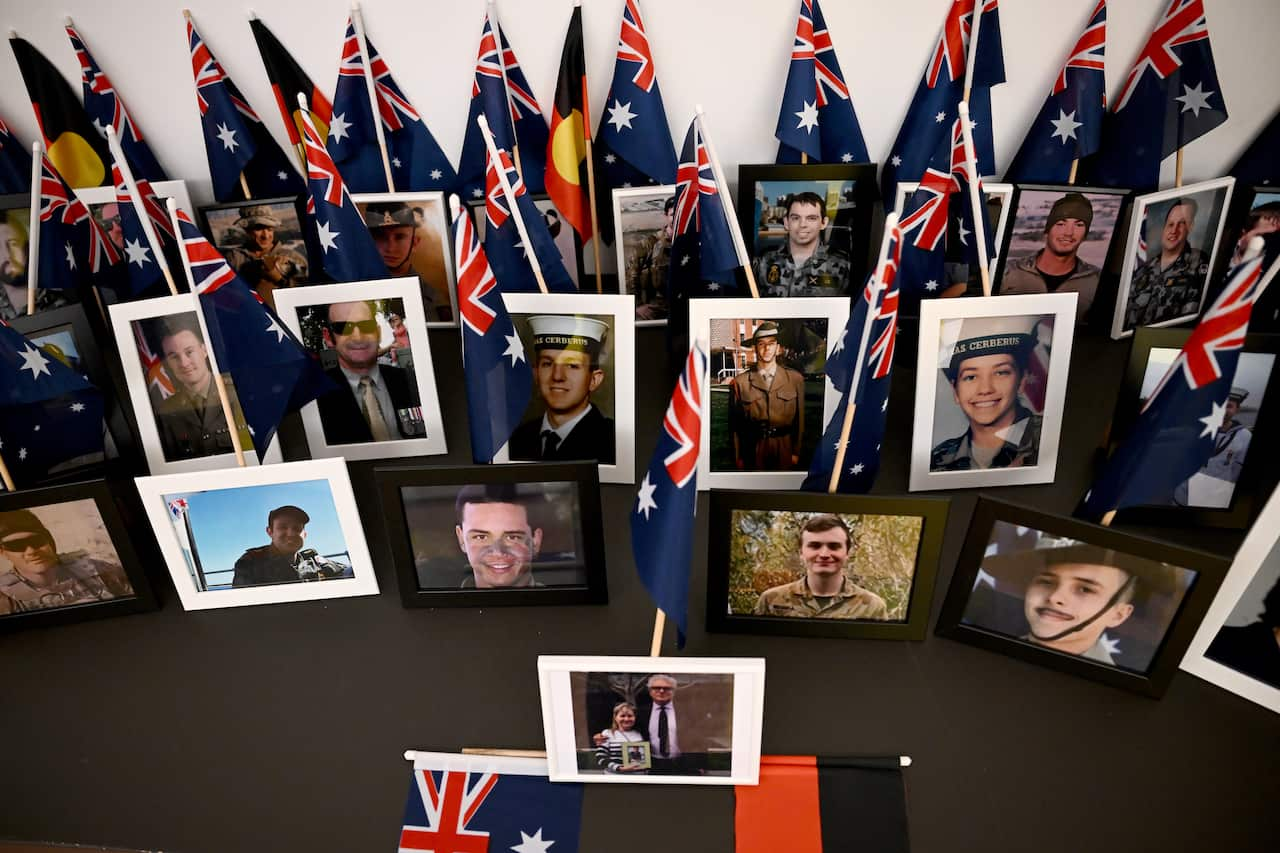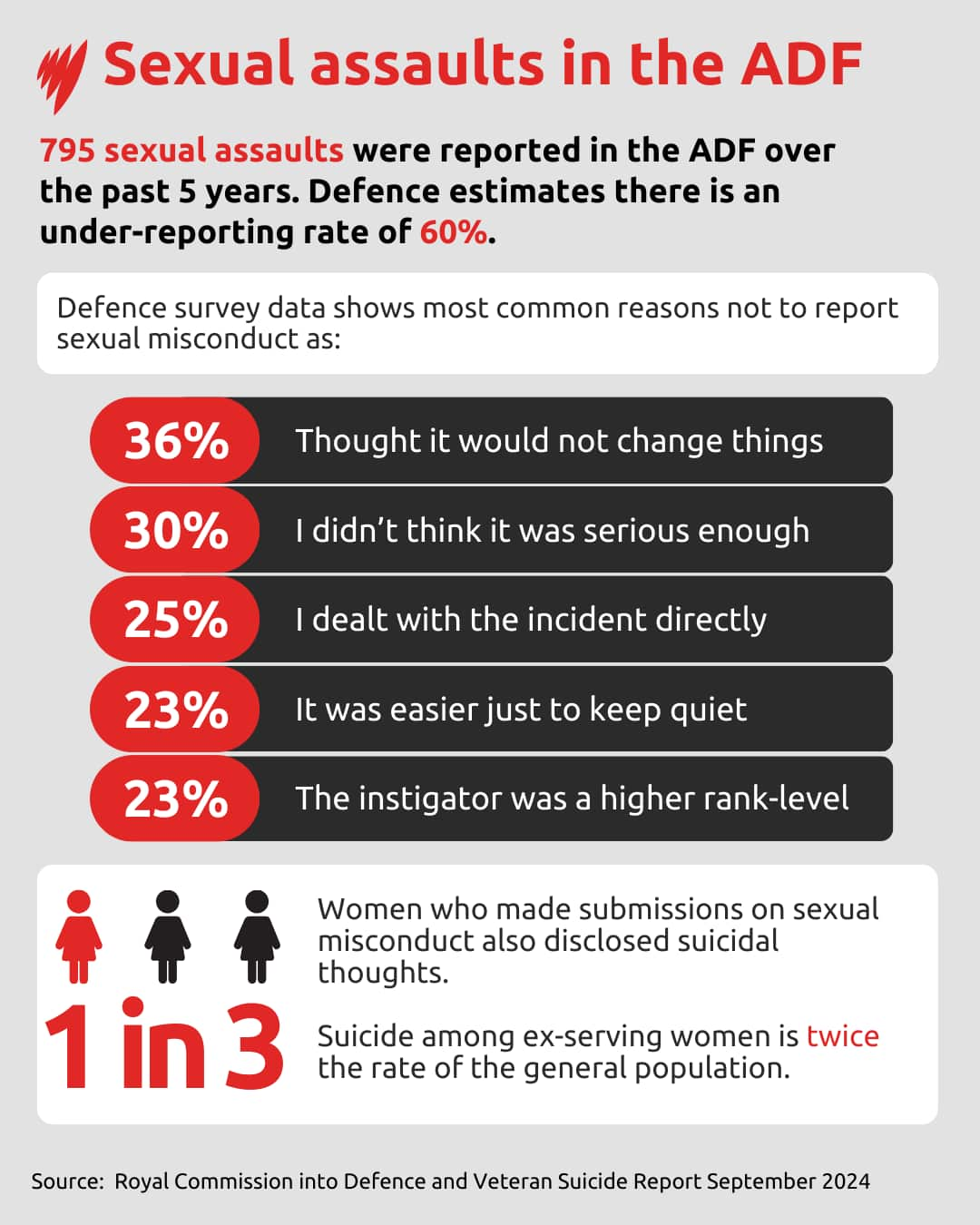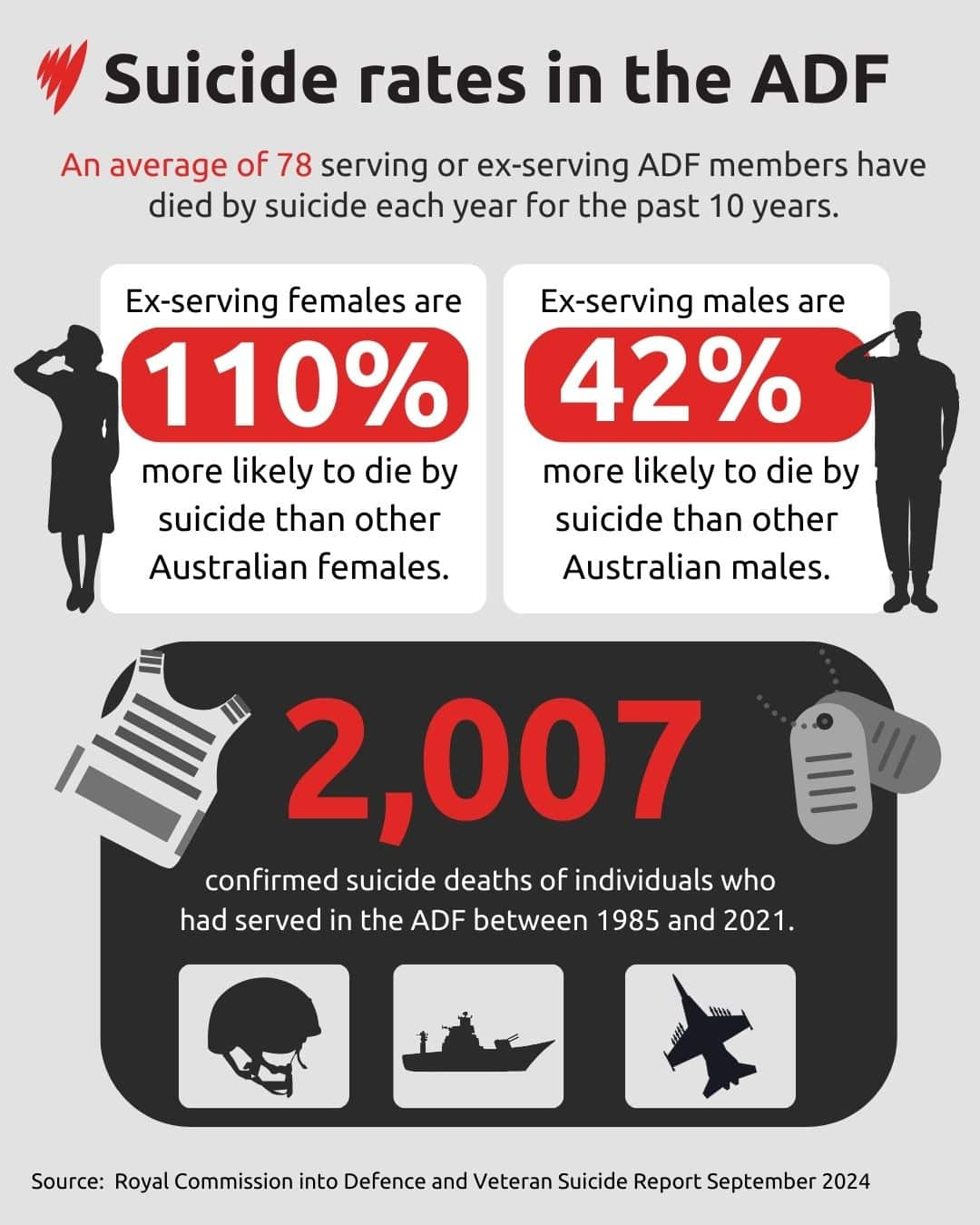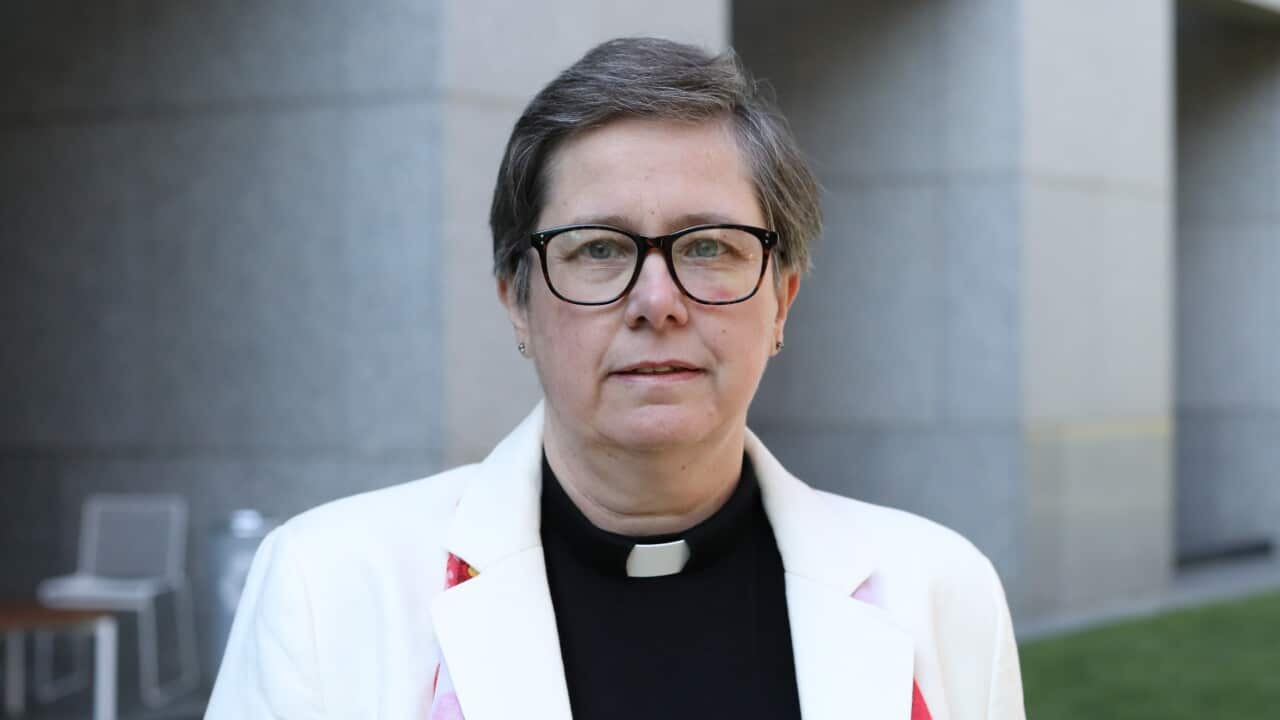Key Points
- The Royal Commission into Defence and Veteran Suicide was tabled on Monday.
- It made 122 recommendations, including an independent inquiry into sexual violence.
- Commissioners found the impact of sexual violence on serving and ex-serving members was “nothing short of horrific”.
This article contains references to sexual assault and suicide.
Reverend Nikki Coleman says working for the Royal Australian Air Force showed her the “best” and “worst” of people.
Coleman joined the RAAF as a chaplain in 2017. Two years into what she described as an “amazing opportunity”, she started working with her alleged abuser.
“I was able to help people in their time of need, and saw firsthand how we need to look after Australia,” she told SBS News.
“But I also saw the worst of people too, because the ADF has become the employer of choice for bullies and sexual predators. And unfortunately, I was a victim of that.”
In August 2023, her legal counsel told the Royal Commission into Defence and Veteran Suicide that she suffered physical and indecent assault without consent, threats of dismissal, unfair work practices and bullying during her time with the Australian Defence Force (ADF).
In her submission, she recounted how she “begged for help”.
Portraits of ADF personnel who died by suicide are placed outside the closing sitting of the Royal Commission into Defence and Veteran Suicide in Sydney in late August. Source: AAP / Bianchi De Marchi
After being repeatedly told not to share information about her experience, she took a medical discharge from the ADF to give evidence to the commission about “Defence’s dirty little secret”.
“For far too long they’ve covered things up. They actually have pretty good policies for dealing with bullying and sexual harassment and sexual assault, but then they don’t use those policies,” she told SBS News.
“The biggest problem is that members of the ADF can’t join a union, they can’t talk to the media. They generally can’t speak about what their job is, and we were ordered, in my case, to not talk about my abuse or how the ADF handled it.”
Coleman said many never “report bullying, sexual harassment and sexual assault in Defence because of the way it’s handled for those people who do decide to report it”.
For her, this included being isolated to one building block and ostracised from her workmates, with no similar limitations on her abuser.
The final report of the Royal Commission into Defence and Veteran Suicide, tabled in parliament by Defence Minister Richard Marles on Monday, made 122 recommendations to prevent “unacceptably high” rates of suicides among serving and ex-serving members of the ADF.
‘The greatest source of danger comes from within the ADF itself’
The royal commission found that while both women and men experience sexual assault in the military, it is disproportionately experienced and reported by women.
One in eight women in the ADF self-reported experiencing sexual misconduct, which includes sexual harassment and sexual assault, in the previous 12 months, according to a Workplace Behaviour Survey with a sample size of 790 men and women.
The report drew a causal relationship between experiences of sexual misconduct towards women, both from the trauma of the event and the institutional response, with higher rates of suicide.
Suicide among ex-serving women is at twice the rate of the general population.
Hundreds of harrowing testimonies described the treatment of women serving in the ADF. Some detailed gang rapes, others being assaulted during arms training.
The royal commission’s final report establishes a consistent pattern of a workplace where women are routinely assaulted, harassed, intimidated, and humiliated by other officers.
It notes that for women serving in the ADF, “the greatest source of danger comes from within the ADF itself”.
In the past five years, on average there’s been a sexual assault reported every second day. But the ADF estimates an under-reporting rate of 60 per cent.
“Sexual violence in the military is, in our experience, far more common than it should be. And that has a long-lasting impact on anyone who is exposed to it,” Commissioner Penny Brown said on Monday.
Calls for Defence to be ‘held to account’
The commissioners found the impact of sexual violence on serving and ex-members “nothing short of horrific”.
Their final report has called on the government to commission an external, independent inquiry into military sexual violence in the ADF.
The Athena Project advocates for veterans who are victims and survivors of sexual violence within the service or at the hands of a serving member.
Founder and director Jordan Gray said any inquiry needs to establish the true incident rate of sexual violence within Defence as well as dismiss anyone who has been convicted of civil offences such as sexual assault.
“I think data collection is a good place to start. And then from there, it’s all about rewriting and rewiring the culture that’s internal within the Defence Force itself,” she told SBS News.
“We need to essentially get rid of the people who have caused issues and stop holding a space for them and creating an unsafe workplace for people going forward. I think it’s important that we do that and hold people to account.”
Gray referenced the 2021 Broderick review which found that Defence was unable to track offenders, repeat offenders could not be identified and the level of risk to other ADF members could not be determined or addressed.
The royal commission noted the ADF relies on serving members to voluntarily disclose to their superior if they are convicted of a sexual offence, with no mechanism for tracking convictions available.
It recommended the Chief of Defence should issue a directive that anyone who is found to have engaged in any form of sexual misconduct is discharged.
Minister for Veterans’ Affairs and Defence Personnel Matt Keogh said the findings were “surprising” and of “great concern”, but reiterated that the government was taking all recommendations seriously.
“I understand for victims, they certainly feel that their experience has not been the right one and it hasn’t been,” he said on Tuesday.
“We want to make sure Defence is an employer of choice. We want to encourage people to continue to join our Defence Force, and that’s why implementing recommendations like those that go to culture and Defence Force is so important.”
What else did the royal commission recommend?
The 600-page volume on sexual misconduct made 13 recommendations related to preventing sexual violence and improving how to manage incidents.
It recommended research on the prevalence of sexual violence, including the link to suicidality and the release of annual data showing details such as age, rank and gender of both victims and perpetrators.
It proposed better protections for people reporting offences including no negative career consequences, ensuring victims are not posted with perpetrators after abuse takes place and mandatory training for management on how to investigate incidents.
Coleman agreed that an inquiry was the right way forward and said changes needed to start at the top, with leadership having a “zero tolerance” towards sexual misconduct.
“If they actually took unacceptable behaviour seriously, that’s where it starts. So sexual assault and sexual harassment is really not about the sexual element,” she said.
“It’s about showing power and aggression, and if they nipped bullying in the bud, it wouldn’t then escalate into somebody feeling like they can go ahead and sexually assault someone.”
If you or someone you know is impacted by sexual assault, call 1800RESPECT on 1800 737 732, text 0458 737 732, or visit . In an emergency, call 000.
Readers seeking support can contact Lifeline crisis support on 13 11 14, Suicide Call Back Service on 1300 659 467 and Soldier On Australia on 1300 620 380.
If you or someone you know is impacted by family and domestic violence, call 1800RESPECT on 1800 737 732, text 0458 737 732, or visit . In an emergency, call 000.
, operated by No to Violence, can be contacted on 1300 766 491.



